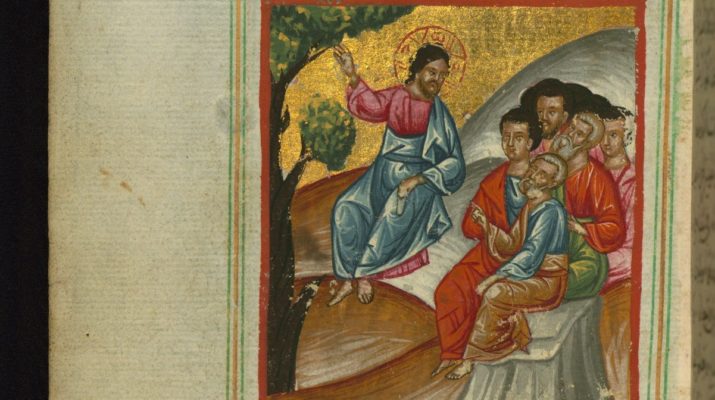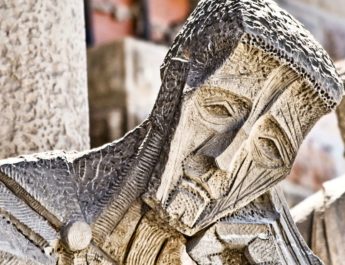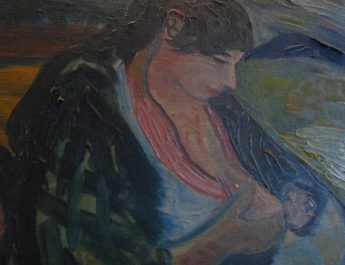Luke 10:1-11, 16-20
Ordinary C32
1 After this the LordA appointedB seventyC-twoD othersE
A “Lord” = Kurios. From kuros (authority, supremacy). This is a respectful address meaning master or sir. It refers to one who has control or power greater than one’s own. So, it was also applied to God and Jesus as Master or Lord.
B “appointed” = anadeiknumi. 2x in NT. From ana (up, again, back, among, anew) + deiknumi (to show, point out, exhibit; figurative for teach, demonstrate, make known). This is to show, appoint, exhibit, indicate.
C “seventy” = hebdomekonta. 5x in NT. From hebdomos (seventh); {from hepta (seven or seventh; figuratively, the number of completeness or perfection)} + deka (ten or -teen). This is seventy.
D “two” = duo. This is two or both.
E “others” = heteros. This is other, another, different, strange. It is another of a different kind in contrast to the Greek word allos, which is another of the same kind. This could be a different quality, type, or group.
and sentF them on aheadG of him in pairsH
F “sent” = apostello. From apo (from, away from) + stello (to send, set, arrange, prepare, gather up); {probably from histemi (to make to stand, stand, place, set up, establish, appoint, stand firm, be steadfast)}. This is to send forth, send away, dismiss, send as a messenger. It implies one that is sent for a particular mission or purpose rather than a quick errand. This is where “apostle” comes from.
G {untranslated} = prosopon. From pros (at, towards, with) + ops (eye, face); {from optanomai (to appear, be seen); perhaps from horao (become, seem, appear)}. This is the face, surface, or front. It can imply presence more generally.
H “pairs” = duo + duo. Literally, “two by two.” Same as “two” in v1. See note D above.
to everyI townJ and placeK where he himself intendedL to go.M
I “every” = pas. This is all or every.
J “town” = polis. This is a city or its inhabitants. It is a town of variable size, but one that has walls. This is where “metropolis” and “police” come from.
K “place” = topos. This is a place or region. It is a smaller space that can only hold a limited number of people whereas chora is a larger place. Figuratively it could be an opportunity.
L “intended” = mello. Perhaps from melo (something that one is worried or concerned about, something one pays attention to or thinks about). Properly, this is ready, about to happen, to intend, delay, or linger. This is just on the point of acting.
M “go” = erchomai. This is to come or go.
2 He said to them, “TheN harvestO is plentiful,P but the laborersQ are few;R
N {untranslated} = men. This is truly, indeed, even, in fact. Often, it is not translated, but used to emphasize affirmation.
O “harvest” = therismos. 13x in NT. From therizo (to reap, gather, harvest); from theros (summer; the heat, which implies summer); from thero (to heat). This is harvesting or reaping. By implication, it is the crop that was harvested.
P “plentiful” = polus. This is much, often, plenteous – a large number or a great extent.
Q “laborers” = ergates. 16x in NT. From ergazomai (to work, labor); {from ergon (word, task, action, employment)}. This is a field laborer – later used to refer to workers in general. It can also be used figuratively for teachers.
R “few” = oligos. This is few or small – it can be a short time or extent, low light, amount, or worth.
therefore askS the Lord of the harvest to send outT laborers into his harvest. 3 GoU, V on your way; I am sending you out like lambsW into the midstX of wolves.Y
S “ask” = deomai. From deo (to tie, bind, fasten, impel, compel; to declare something against the law or prohibited) This is having an urgent need because one is missing or needing something so it is an earnest appeal or pressing request.
T “send out” = ekballo. From ek (from, from out of) + ballo (to throw, cast, place, put, drop). This is to throw, put out, produce, expel, banish. It is eject in a literal or figurative sense.
U “go” = hupago. From hupo (by, under, under the authority of) + ago (lead, bring, guide, spend, drive, carry). This is to lead under so to depart, go away, or die. It is to lead away under the command of someone else, being given a mission or objective to carry out.
V {untranslated} = idou. From eido (to be aware, see, know, remember, appreciate). This is see! Lo! Behold! Look! Used to express surprise and or draw attention to the statement.
W “lambs” = aren. 1x in NT. Perhaps from the same as arrhen (male, man); from arsen (male, man) or from airo (raise, take up, lift, remove)}. This is a male lamb or sheep.
X “midst” = mesos. Perhaps from meta (with among, behind, beyond; implies a change following contact or action). This is middle, among, center, midst.
Y “wolves” = lukos. 6x in NT. Perhaps related to leukos (bright, white); from luke(light). This is wolf or maybe jackal. Figuratively, it means cruel, greedy, or destructive.
4 CarryZ no purse,AA no bag,BB no sandals,CC and greetDD no one on the road.EE
Z “carry” = bastazo. Perhaps from the base of basis (step, hence foot; a pace); from baino (to walk, to go). This is to lift in a literal of figurative sense. It can also mean take up, carry, bear, or remove. Figuratively, it can mean declare, endure, or sustain.
AA “purse” = ballantion. Related to “send out” in v2. 4x in NT. Perhaps from ballo (see note T above). This is a purse or money bag.
BB “bag” = pera. 6x in NT. This is a wallet or leather pouch – can carry food or money.
CC “sandals” = hupodema. Related to “ask” in v2. 10x in NT. From hupodeo (to bind under wear on the feet); {from hupo (by, under, about, subordinate to) + deo (see note S above)}. This is a sandal – something bound under the sole.
DD “greet” = aspazomai. Perhaps from a (with, together with) + a form of spao (to draw, draw out, pull). This is to welcome, salute, or greet. It can also be to embrace or acclaim.
EE “road” = hodos. This is way, road, path, or journey. It can imply progress along a route.
5 Whatever houseFF you enter,GG firstHH say, ‘PeaceII to this house!’JJ
FF “house” = oikia. From oikos (house – the building, the household, the family, descendants; the temple). This is a house, household, goods, property, family, or means.
GG “enter” = eiserchomai. Related to “go” in v1. From eis (to, into, for, among) + erchomai (see note M above). This is to go in in a literal or figurative sense.
HH “first” = proton. From protos (what is first, which could be the most important, the first in order, the main one, the chief); from pro (before, first, in front of, earlier). This is firstly, before, in the beginning, formerly.
II “peace” = eirene. Perhaps from eiro (to join, tie together to form a whole). This is one, peace, quietness, rest, peace of mind, harmony. Peace was a common farewell among Jews (i.e. shalom) and this well-wishing included a blessing of health and wholeness for the individual. This word also indicates wholeness and well-being – when everything that is essential is joined together properly. This is peace literally or figuratively. By implication, it is prosperity (but not in the sense of excessive wealth. Prosperity would have meant having enough from day to day.)
JJ “house” = oikos. Related to “house” in v5. See note FF above.
6 And if a personKK of peace isLL there, your peace will restMM on that person, but if not, it will returnNN to you.
KK “person” = huios. This is son, descendant – a son whether natural born or adopted. It can be used figuratively for other forms of kinship.
LL “is” = eimi. This is to be or exist.
MM “rest” = epanapauo. 2x in NT. From epi (on, upon, among, what is fitting) + anapauo (a break from work, which implies being refreshed; denotes that rest that one gets once a necessary task is finished); {from ana (up, again, back, among, between, anew) + pauo (to stop, refrain, pause, restrain, quit, come to an end)}. This is to rest on, rely on, trust, settle on.
NN “return” = anakampto. 4x in NT. From ana (up, again, back, among, between, anew) + kampto (to bend or bow). This is to return, bend back.
7 RemainOO in the same house,PP eatingQQ and drinkingRR whatever they provide,
OO “remain” = meno. This is to stay, remain, wait, await, continue, abide, endure. It can mean to literally stay in a place or to remain in a condition or to continue with hope and expectation.
PP “house” = oikia. Same as “house” in v5. See note FF above.
QQ “eating” = esthio. This is to eat or figuratively to devour or consume like rust.
RR “drinking” = pino. This is to drink, literally or figuratively.
for the laborer deservesSS to be paid.TT Do not moveUU about from house to house.VV
SS “deserves” = axios. Related to “go” in v3. From ago (see note U above). This is related to weight or worth – deserving, suitable, corresponding, due reward.
TT “be paid” = misthos. This is wages, pay, or salary. It can also be reward, recompense, or punishment. It is pay for services rendered in a literal or figurative way, either good or bad.
UU “move” = metabaino. Related to “carry” in v4. 12x in NT. From meta (with, among, behind, beyond) + baino (see note Z above). This is to pass over, leave, remove, change place.
VV “house to house” = oikia + eis + oikia. Oikia is the same as “house” in v5. See note FF above.
8 Whenever you enter a town and its people welcomeWW you, eat what is set beforeXX you; 9 cureYY the sickZZ who are there,
WW “welcome” = dechomai. This is to warmly receive, be ready for what is offered, take, accept, or welcome. It is to receive in a literal or figurative sense.
XX “set before” = paratithemi. 19x in NT. From para (by, beside, in the presence of) + tithemi (to put, place, set, fix, establish in a literal or figurative sense; properly, this is placing something in a passive or horizontal position). This is properly, to set beside or place before. So, it can mean to set or serve a meal, to deposit something with someone, to set forth an argument. It can also mean to entrust, commend, or tell a parable (as setting forth information).
YY “cure” = therapeuo. Related to “harvest” in v2. From therapon (servant, attendant, minister); perhaps from theros (see note O above). This is to serve, care, attend, heal, or cure. Since it means to attend to, it can be used for doctors, but also for those who serve God. So, it can mean worship. This is where the word “therapy” comes from.
ZZ “sick” = asthenes. From a (not) + sthenes (strong, vigor); {from the base of sthenoo (to strengthen so that one can be mobile); from sthenos (strength)}. This is without strength so weak, sick, helpless, frail, feeble. It can also be unimpressive or impotent. It can be used for physical or moral weakness.
and say to them, ‘The kingdomAAA of GodBBB has come nearCCC to you.’ 10 But whenever you enter a town and they do not welcome you, go outDDD into its streetsEEE and say,
AAA “kingdom” = basileia. Related to “carry” in v4 & “move” in v7. From basileus (king, emperor, sovereign); probably from basis (see note Z above). This is kingdom, rule, authority, sovereignty, royalty, a realm.
BBB “God” = Theos. From Proto-Indo-European origins, meaning do, put, place. This is God or a god in general.
CCC “come near” = eggizo. From eggus (nearby or near in time). This is extremely close by – approaching, at hand, immediately imminent.
DDD “go out” = exerchomai. Related to “go” in v1 & “enter” in v5. From ek (from, from out of) + erchomai (see note M above). This is to go out, depart, escape, proceed from, spread news abroad.
EEE “streets” = plateia. 9x in NT. From platus (wide, spread flat, broad); perhaps from plasso (to form, mold; to create like a potter shapes clay). This is a street or some kind of broad place like a public square.
11 ‘Even the dustFFF of your town that clingsGGG to our feet,HHH we wipe offIII in protest against you. Yet knowJJJ this: the kingdom of God has come near.’
FFF “dust” = koinortos. 5x in NT. From konia (dust, lime) + ornumi (to stir up). This is dust.
GGG “clings” = kollao. 12x in NT. From kolla (glue). This is to glue together. So it is joining, spending time with, or being intimately connected to. It can be used for marriage, joining the church, clinging, or adhering to something. It was also used medically for uniting wounds.
HHH “feet” = pous. This is foot literal or figurative.
III “wipe off” = apomasso. 1x in NT. From apo (from, away from) + masso (to knead, squeeze). This is to wipe or scape off.
JJJ “know” = ginosko. This is to know, recognize, realize, perceive, learn. It is knowledge gained through personal experience.
16 “Whoever listensKKK to you listens to me, and whoever rejectsLLL you rejects me, and whoever rejects me rejects the one who sent me.”
17 The seventy-two returnedMMM with joy,NNN
KKK “listens” = akouo. This is hear or listen, but it also means to understand by hearing. This is where the word “acoustics” comes from.
LLL “rejects” = atheteo. Related to “set before” in v8. 16x in NT. From athetos (not having position or place); {from a (not) + tithemi (see note XX above)}. This is setting something aside, ignoring or nullifying it, refusing or rejecting. It can also mean to annul or cancel out the effect of something. Literally, this is to un-place. It can also be rejecting something, despising it, or considering something invalid.
MMM “returned” = hupostrepho. From hupo (by, under, about) + strepho (to turn, change, turn back, be converted; to turn around completely to take the opposite path or a completely different one); {from trope (turning, shifting, a revolution; figuratively, a variation); from trepo (to turn)}. This is to turn back or behind in a literal or figurative sense.
NNN “joy” = chara. From chairo (to rejoice, be glad or cheerful; a greeting); from char– (to extend favor, lean towards, be inclined to be favorable towards). This is joy, delight, gladness. Can be understood as the feeling you get when you are aware of grace.
saying, “Lord, in your nameOOO even the demonsPPP submitQQQ to us!”
OOO “name” = onoma. Related to “know” in v22. May be from ginosko (see note JJJ above). This is a name, authority, cause, character, fame, reputation. The name was thought to include something of the essence of the person so it was not thought to be separate from the person.
PPP “demons” = daimonion. From daimon (evil spirit, demon, fallen angel); perhaps from daio (giving out destinies). This is demon, evil spirit, god of another religion, or fallen angel.
QQQ “submit” = hupotasso. From hupo (by, under, about, under one’s authority) + tasso (to arrange, appoint, determine). This is to place under. So it is to subject, submit, obey, or subordinate.
18 He said to them, “I watchedRRR SatanSSS fallTTT from heavenUUU like a flash of lightning.VVV
RRR “watched” = theoreo. From theaomai (to behold, look upon, see, contemplate, visit); from thaomai (to gaze at a spectacle; to look at or contemplate as a spectator; to interpret something in efforts to grasp its significance); from theoros (a spectator or envoy). This is gazing, beholding, experiencing, discerning. It is looking at something to analyze it and concentrate on what it means. This is the root of the word “theatre” in that people concentrate on the action of the play to understand its meaning.
SSS “Satan” = Satanas. From Hebrew satan (adversary, Satan); from satan (to be an adversary, attack, accuse, resist). This is Satan, the adversary, or an adversary.
TTT “fall” = pipto. This is to fall literally or figuratively.
UUU “heaven” = ouranos. May be related to oros (mountain, hill) with the notion of height. This is the air, the sky, the atmosphere, and heaven. It is the sky that is visible and the spiritual heaven where God dwells. Heaven implies happiness, power, and eternity.
VVV “flash of lightning” = astrape. 9x in NT. From astrapto (to flash with or like lightning, be dazzling); probably from aster (star literally or figuratively); probably from stronnumi or stronnuo (to spread, make a bed). This is lightning, brightness, glare, or ray.
19 Indeed,WWW I have givenXXX you authorityYYY to treadZZZ on snakesAAAA and scorpionsBBBB
WWW “indeed” = idou. Same as {untranslated} in v3. See note V above.
XXX “given” = didomi. To give, offer, place, bestow, deliver. This is give in a literal or figurative sense.
YYY “authority” = exousia. Related to “is” in v6. From exesti (to be permitted or lawful); {from ek (out, out of) + eimi (see note LL above)}. This is power to act or weight. It especially denotes moral authority or influence. It can mean domain, liberty, freedom, capacity, mastery, right, force, or strength.
ZZZ “tread” = pateo. 5x in NT. From patos (trodden) OR from paio (to strike or sting). This is to tread or trample on in a literal or figurative sense.
AAAA “snakes” = ophis. Related to {untranslated} in v1. 14x in NT. Perhaps from optanomai (see note G above). This is snake or serpent, often used of the devil. It is the snake as a type that is sly or cunning – someone malicious.
BBBB “scorpions” = skorprios. 5x in NT. Perhaps from skerpo (to pierce); from skopos (a mark or goal like the marker at the end of a race; figuratively, other goals or destinations; also, a watch or sentry); from skeptomai (to peer out, consider, gaze carefully). This is scorpion – from the root as regards its sting.
and over allCCCC the powerDDDD of the enemy,EEEE and nothing will hurtFFFF you.
CCCC “all” = pas. Same as “every” in v1. See note I above.
DDDD “power” = dunamis. From dunamai (to be able, have power or ability). This is might, strength, physical power, efficacy, energy, and miraculous power. It is force literally or figuratively – the power of a miracle or the miracle itself.
EEEE “enemy” = echthros. From echthos (hatred). This is an openly hostile person so an enemy, a foe, or a hated person. This speaks of irreconcilable hostility. It can also mean adversary and/or refer to Satan.
FFFF “hurt” = adikeo. From adikos (unjust, unrighteous, wicked, treacherous); {from a (not, without) + dike (the principle of justice; that which is right in a way that is very clear; a decision or the execution of that decision; originally, this word was for custom or usage; evolved to include the process of law, judicial hearing, execution of sentence, penalty, and even vengeance; more commonly, it refers to what is right); may be from deiknumi (to show, point out, exhibit; figurative for teach, demonstrate, make known)}. This is to harm, damage, behave in an unjust way. It can also refer to an offender. It is moral wrong, especially caused by neglecting justice.
20 Nevertheless, do not rejoiceGGGG at this, that the spiritsHHHH submit to you, but rejoice that your names are writtenIIII in heaven.”JJJJ
GGGG “rejoice” = chairo. Related to “joy” in v17. See note NNN above.
HHHH “spirits” = pneuma. From pneo (to blow, breathe, breathe hard). This is wind, breath, or ghost. A breeze or a blast or air, a breath. Figuratively used for a spirit, the human soul or part of us that is rational. It is also used supernaturally for angels, demons, God, and the Holy Spirit. This is where pneumonia comes from.
IIII “written” = eggrapho. 3x in NT. From en (in, on, at, by, with) + grapho (to write, describe). This is to write, record, or inscribe in a register.
JJJJ “heaven” = ouranos. Literally, “in the heavens.” Same as “heaven” in v18. See note UUU above.
Image credit: “Illuminated Manuscript, Gospels, Walters Art Museum Ms. W.592, fol. 10a.”




